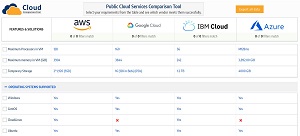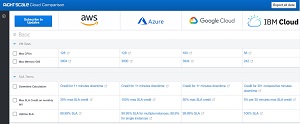News
Online Tools Provide At-a-Glance Cloud Platform Comparisons
A new cloud comparison tool provides at-a-glance tables and links to help decision-makers evaluate and compare myriad services from the major platforms offered by AWS, Google, IBM and Microsoft.
Those cloud service providers offer so many different kinds and levels of services and products that a mini cottage industry has sprung up in efforts to help execs make decisions about which vendor to choose for what.
The latest entrant to this niche is Wire19.com, which touts its Cloud Comparison Tool in a blog post today (March 6).
"The purpose of this blog is to cover the breadth of services these leading cloud providers offer, at a single place as the services, features and pricing of all of them are so varied that comparing them is like comparing apples to oranges," the post said.
"We have included not only the basic IaaS services -- compute, networking and storage, but have also included optional/other cloud services that these providers offer to value-add. The services include Platform as a Service (PaaS) and Software as a Service (SaaS) that include, but are not limited to Disaster Recovery, Backup, Content Delivery Network (CDN), DevOps, Artificial Intelligence (AI), Internet of Things (IoT) etc."
 [Click on image for larger view.]
Cloud Comparison Tool from ZNet (source: ZNet)
[Click on image for larger view.]
Cloud Comparison Tool from ZNet (source: ZNet)
The post presents data from the tool that covers areas such as OS support, pricing terms, certifications, SLA availability, compute, storage, database, content delivery and networking, Internet of Things, analytics and Big Data, intelligence, identity access and security, monitoring and management, developer tools, enterprise integration and mobile services.
Using the associated cloud comparison tool provides transparency, Wire19.com said, that helps enterprise customers:
- Do proper provider evaluation and selection, based on the services, regions, support, certifications etc.
- Save time by quickly selecting the most appropriate services, as all offerings are at one place.
- Get cost optimization and savings.
- Plan for the future by seeing which provider provides services users may need in the future.
While the comparison tool now only supports the top four platforms mentioned above, Oracle and Alibaba Cloud support is planned.
India-based ZNet Technologies publishes the tool and the Wire19.com site.
It joins similar tools already in the market, of which a prominent example is the RightScale Cloud Comparison site that also covers AWS, Azure, Google Cloud and IBM Cloud.
 [Click on image for larger view.]
Cloud Comparison Tool from RightScale (source: RightScale)
[Click on image for larger view.]
Cloud Comparison Tool from RightScale (source: RightScale)
That tool, announced in 2016, highlights cloud functionality across several categories:
- Basic cloud services: VM sizes, SLA terms, security certifications, supported operating systems and geographic locations.
- Core cloud services: Compute, network and storage services.
- Database services: Relational databases, non-relational databases and other DBaaS (database-as-a-service) offerings.
- Additional services: Application, security and identity services.
"Enterprises are using public and private in record numbers, and as we saw in the RightScale 2015 State of the Cloud Report, 82 percent of enterprises report a multi-cloud strategy," said exec Kim Weins at the time. "Now one of the big questions is how companies can pick the best, most optimized cloud for each specific workload or use case. We created RightScale Cloud Comparison to make it easier for IT to become an effective cloud broker of different cloud services across the leading public clouds."
Also in 2016, CloudPhysics announced the Cost Calculator for Private Cloud with the Public Cloud Comparison tool. "This data-driven solution automates the process of determining the accurate costs of a customer's currently resourced on-premises Virtual Machines (VMs)," the company said at the time. "Customers can compare those amounts to the costs for the same VMs if they were migrated to a public cloud." However, that tool, like some similar offerings, isn't presented as a free stand-alone tool available on the Web, but was rather included in the company's software subscriptions.
About the Author
David Ramel is an editor and writer at Converge 360.